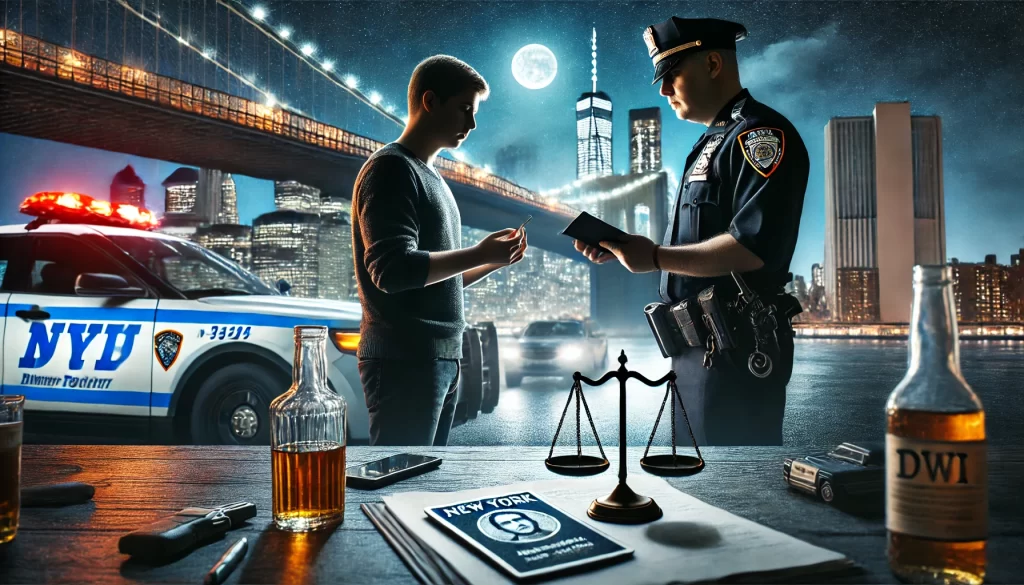Drunk drivers cause more than 17,000 deaths annually, equivalent to one death per 30 minutes or 310 funerals per week. And in New York, at least 30% of fatal crashes are alcohol-related. The state takes DWI offenses very seriously, with strict penalties that can impact your life in many ways.
A DWI charge can arise if you’re caught driving with a blood alcohol content (BAC) of 0.08% or higher. Whether you’re a driver, a passenger, or simply a resident of the state, it is important to understand this law to ensure everyone’s safety on the road.

According to DWI lawyer Jeff Greco, your charges could be reduced, dismissed, or acquitted at trial if you have the right advocate for your case while he presents you in court. Understanding this law means knowing the potential consequences of a conviction and what to expect if you’re pulled over.
Learn how you can better handle the case if you want to avoid being charged or need to know your rights after being charged.
Blood Alcohol Concentration (BAC) Limits
When driving in New York, you must keep your BAC levels below the legal limit to avoid DWI charges. The legal limit for BAC in New York is 0.08%. This means that if you’re operating a vehicle with a BAC of 0.08% or higher, you’re considered legally impaired and can be charged with a DWI offense.
It is important to understand that even if your BAC is below the legal limit of 0.08%, you can still face charges if law enforcement believes your ability to operate a vehicle safely is impaired due to alcohol or drugs. This is known as a DWAI, or Driving While Ability Impaired charge, which can be issued if your BAC is between 0.05% and 0.07%.
To avoid the severe consequences of a DWI or DWAI charge in New York, always designate a sober driver, use public transportation, or take a taxi or ride-sharing service if you have been drinking. Prioritize safety for yourself and others on the road by never getting behind the wheel if you have consumed alcohol.
Penalties for DWI Offenders
If convicted of a DWI offense in New York, you’ll face significant penalties. For a first offense, you may receive a fine ranging from $500 to $1,000, up to one year in jail, and a minimum six-month license revocation.
The penalties escalate for subsequent offenses within a ten-year period. A second offense can result in fines up to $5,000, up to four years in prison, and a minimum one-year license revocation. If you’re convicted of a third DWI within ten years, you could face fines up to $10,000, up to seven years in prison, and a minimum one-year license revocation.
All DWI offenders in New York must attend a Victim Impact Panel and may be required to install an ignition interlock device on their vehicles. These penalties emphasize the seriousness with which New York treats DWI offenses and the importance of responsible driving.
A criminal lawyer offering a free consultation can explain the specific charges against you, the potential penalties, and what the prosecution must prove for a conviction. They’ll help you understand the legal process and what to expect as your case progresses.
Aggravating Factors in DWI Cases
Aggravating factors in DWI cases can significantly impact the severity of penalties imposed on offenders in New York. These factors include having a blood alcohol concentration of 0.18% or higher, driving with a suspended or revoked license, causing an accident resulting in injury or death, having a prior DWI conviction within the last ten years, refusing a chemical test, or having a minor below the age of 15 in the vehicle at the time of the offense.
If any of these aggravating factors are present in your DWI case, you may face harsher consequences, such as increased fines, longer license suspensions, the mandatory installation of an ignition interlock device, and potential jail time. Judges and prosecutors take these factors seriously and are less likely to show leniency when any aggravating circumstances are involved.
It is important to seek legal representation if you’re facing a DWI charge with aggravating factors. An experienced attorney can help handle the complexities of your case and work towards minimizing the impact of these factors on your penalties.
Potential Defenses for DWI Charges
Facing DWI charges with aggravating factors can be daunting, but exploring potential defenses is critical to building a strong legal strategy. One common defense is challenging the validity of the traffic stop. If the police didn’t have reasonable suspicion to pull you over, any evidence gathered after the stop may be inadmissible.
Another defense could involve questioning the accuracy of field sobriety tests or breathalyzer results. Factors such as medical conditions, improper administration of tests, or faulty equipment could all contribute to inaccurate readings.
Challenging the chain of custody of blood alcohol samples or questioning the training and certification of the officers involved in the arrest are additional avenues for defense. Arguing that your constitutional rights were violated during the arrest process could also be a potential defense strategy.
Implications of a DWI Conviction
Anyone dealing with New York’s legal system must understand DWI penalties. DWI convictions in New York can result in serious penalties that may affect your life. First, depending on your case, you may face hundreds to thousands of dollars in fines. DWI convictions often result in driver’s license suspension or revocation, making it difficult to go to work, school, or perform everyday commitments.
A DWI conviction can also raise your insurance prices or cancel your coverage. This financial burden may extend beyond judicial processes. If your profession requires driving or a clean criminal record, a DWI can hurt your chances of being hired. Remember that a DWI conviction can affect your personal and professional life beyond the legal repercussions.
Conclusion
Understanding New York DWI regulations is essential to handling the judicial system if charged. Knowing your rights and obligations might affect your case, from BAC limits to defenses. Seek legal advice and be proactive about DWI issues to safeguard your future and prevent harsh penalties.
Why You Should Take DWI Charges Seriously in New York
Getting charged with a DWI here isn’t something that just gets you a slap on the wrist. It’s a criminal offense, and depending on your blood alcohol content (BAC), previous record, or if someone got hurt, the penalties can escalate quickly.
Some of the real-life consequences people face include:
- Automatic license suspension (even before you’re convicted)
- Thousands of dollars in fines, court fees, and insurance hikes
- Mandatory ignition interlock device installation (yes, even for a first offense)
- Jail time in certain cases, even without any accidents
- Permanent criminal record, which could affect jobs, housing, or immigration status
Once you’re charged, it’s not just a ticket—it’s a legal battle. And the more you know, the better chance you have of getting through it.
What Exactly Qualifies as a DWI in New York?
Most people think you have to be falling-down drunk to get arrested. That’s not how it works. In New York, law enforcement uses several classifications under Vehicle and Traffic Law (VTL), each with different levels of severity.
Key Legal Definitions Under NY Vehicle and Traffic Law
Here’s how the state breaks it down:
| Offense | BAC Range | Description |
|---|---|---|
| Driving While Ability Impaired (DWAI/Alcohol) | 0.05% to 0.07% | Not legally drunk but impaired by alcohol |
| Driving While Intoxicated (DWI) | 0.08% or higher | Standard for intoxication |
| Aggravated DWI | 0.18% or higher | Extremely high BAC with enhanced penalties |
| DWAI/Drugs | No BAC standard | Impaired by drugs (prescription or illegal) |
| DWAI/Combination | N/A | Impaired by both alcohol and drugs |
Each of these carries a different level of punishment, and the penalties get harsher the more serious or repeated the offense.
What Counts as “Drugs” in DWAI/Drugs?
This is a question I get often. It’s not just illegal substances—legal ones count too. If you’re under the influence of:
- Prescription medication (like opioids or benzodiazepines)
- Over-the-counter sleep aids
- Cannabis (even though it’s legal recreationally in NY)
- Any controlled substance listed under Public Health Law §3306
You can still be charged. Officers are trained to detect signs of drug impairment, and they often call in Drug Recognition Experts (DREs) to conduct specialized field evaluations.
How Police Determine If You’re Impaired
It’s not just about the breathalyzer. Officers are trained to look for multiple signs of intoxication or impairment. Here’s what they typically assess:
- Slurred speech or glassy eyes
- Odor of alcohol or cannabis
- Erratic driving patterns (weaving, speeding, sudden stops)
- Field Sobriety Tests (walk-and-turn, horizontal gaze nystagmus, etc.)
- Chemical tests (breath, blood, urine)
If you refuse a chemical test in New York, it triggers an automatic civil penalty, including:
- Immediate license suspension
- $500 civil penalty
- A mandatory one-year revocation of your driving privilege (even without a conviction)
First-Time Offenders: What Can You Expect?
You’d think the courts might go easy if it’s your first time, but that’s not always the case. First-offense DWI charges can still bring:
- Up to 1 year in jail
- Fines ranging from $500 to $1,000
- License suspension for at least 6 months
- Mandatory enrollment in the Drinking Driver Program (DDP)
- Ignition interlock device for at least 6 months
What shocks most people is how quickly everything happens. You can be arraigned within 24 hours, and if your license is suspended, you’re suddenly without transportation to work or school.
The Difference Between Criminal and Administrative Penalties
This is where people often get confused. You can face two tracks of punishment:
- Criminal: Fines, jail, probation, criminal record.
- Administrative (DMV): Points, license suspension or revocation, civil penalties.
Even if the court drops or reduces charges, the DMV can still act separately to suspend your license based on your BAC level or refusal to test.
Aggravating Factors That Make Penalties Worse
Some situations lead to significantly tougher consequences, including:
- Having a minor in the vehicle (Leandra’s Law makes it a felony)
- Accidents involving injury or death
- Previous DWI convictions within 10 years
- Refusing the chemical test
- High BAC (0.18% or more)
In these cases, the court may elevate charges to a felony, carry longer license revocations, and even require substance abuse evaluations and alcohol monitoring devices.
Ignition Interlock Devices: What to Know
An Ignition Interlock Device (IID) is a breathalyzer that’s installed in your car. You have to blow into it before starting your vehicle, and it must show a BAC of 0.00% for the engine to start.
Facts about IIDs in New York:
- Mandatory for all DWI convictions
- Installed at your own cost
- Devices must stay in place for at least 6 months
- Any attempt to tamper with or bypass it is a separate crime
Even if you get a conditional license, you’ll still have to use the IID.
Are There Any Ways to Fight the Charges?
Yes, and that’s where a skilled attorney becomes crucial. Common defenses include:
- Challenging the accuracy of chemical tests
- Proving improper police procedure or lack of probable cause
- Demonstrating medical conditions that mimic intoxication
- Questioning the credibility of field sobriety tests
Some cases even get dismissed or downgraded to lesser charges like DWAI, which is a traffic infraction, not a crime.
Conditional Licenses: Can You Still Drive?
If your license is suspended or revoked, you may qualify for a conditional license. This allows you to:
- Drive to work or school
- Attend court-ordered programs
- Travel to medical appointments or DMV hearings
To qualify, you must:
- Enroll in the Impaired Driver Program (IDP)
- Pay program and DMV fees
- Have no prior serious traffic offenses
Be aware, though: if you violate the terms, your license can be revoked entirely.
Long-Term Impact on Your Record
One of the most frustrating aspects of a DWI charge is the long-term consequences. Here’s what it could affect:
- Employment background checks (especially for commercial driving)
- Immigration status (DWI is considered a “crime of moral turpitude” in some cases)
- Child custody disputes
- Travel restrictions to countries like Canada
- Auto insurance premiums, which can double or triple
A conviction stays on your DMV driving record for at least 10 years, and criminal records don’t disappear easily unless sealed under specific circumstances.
CDL Drivers and Underage Offenders
The state is especially strict if you’re a commercial driver or under the age of 21:
For CDL holders:
- BAC limit is 0.04%
- First conviction leads to 1-year disqualification
- Second conviction = lifetime ban
For drivers under 21:
- Zero Tolerance Law = BAC of 0.02% to 0.07%
- Penalties include 6-month license suspension, civil fines, and mandatory alcohol education
Real-Life Case Example: A Wake-Up Call
A 29-year-old nurse I know got pulled over after having two glasses of wine at dinner. Her BAC registered at 0.10%, and she was charged with a misdemeanor DWI. She lost her license, had to install an IID, and nearly lost her nursing license because of the criminal charge. What seemed like a minor incident became a life-changing ordeal.
Helpful Resources and Contacts
If you or someone you know is facing charges related to impaired driving in New York, here are some useful resources:
- NY DMV DWI Overview: dmv.ny.gov
- Office of Court Administration: nycourts.gov
- Legal Aid Society
- New York State Bar Association for finding attorneys






